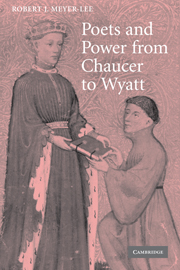Book contents
- Frontmatter
- Contents
- Acknowledgments
- Notes on citations
- Introduction: Laureates and beggars
- PART I BACKGROUNDS
- PART II THE FIRST LANCASTRIAN POETS
- 2 John Lydgate: The Invention of the English Laureate
- 3 Thomas Hoccleve: Beggar Laureate
- PART III FROM LANCASTER TO EARLY TUDOR
- Epilogue: Sir Thomas Wyatt: Anti-laureate
- Notes
- Works cited
- Index
3 - Thomas Hoccleve: Beggar Laureate
Published online by Cambridge University Press: 27 October 2009
- Frontmatter
- Contents
- Acknowledgments
- Notes on citations
- Introduction: Laureates and beggars
- PART I BACKGROUNDS
- PART II THE FIRST LANCASTRIAN POETS
- 2 John Lydgate: The Invention of the English Laureate
- 3 Thomas Hoccleve: Beggar Laureate
- PART III FROM LANCASTER TO EARLY TUDOR
- Epilogue: Sir Thomas Wyatt: Anti-laureate
- Notes
- Works cited
- Index
Summary
In this chapter, as I indicated at the opening of Part II of this book, I take as my point of departure the consensus that Hoccleve's work differs in fundamental ways from Lydgate's; I argue that these differences can only be fully understood by keeping the poetry and poetic careers of both authors in view. I contend, further, that a full discernment of not just the nature of Hoccleve's achievements but also his place in the trajectory of the English literary tradition requires a consideration of laureate poetics, to the development of which he contributed, and that came to dominate this tradition in his own lifetime. In particular, in regard to Hoccleve's textualization of his identity as privy seal clerk, I insist on the structural similarity of this strategy to Lydgate's appearance in his verse as “monk of Bury”: in both cases the author textualizes his historically specific existence and links his identity as poet to the social identity he possesses in the empirical world. Hoccleve, motivated by the same historical conditions and influenced by the same circulation of ideas as Lydgate, was the first candidate for the proto-laureateship that the latter achieved. That Hoccleve ultimately failed to maintain this status, however, points us to the differences that lie alongside the similarities between his and Lydgate's poetic strategies. Although Hoccleve was largely responding to the same climate of patronage, in his position vis-à-vis his patrons he was neither able nor content to develop a coherent laureate poetics.
- Type
- Chapter
- Information
- Poets and Power from Chaucer to Wyatt , pp. 88 - 124Publisher: Cambridge University PressPrint publication year: 2007



